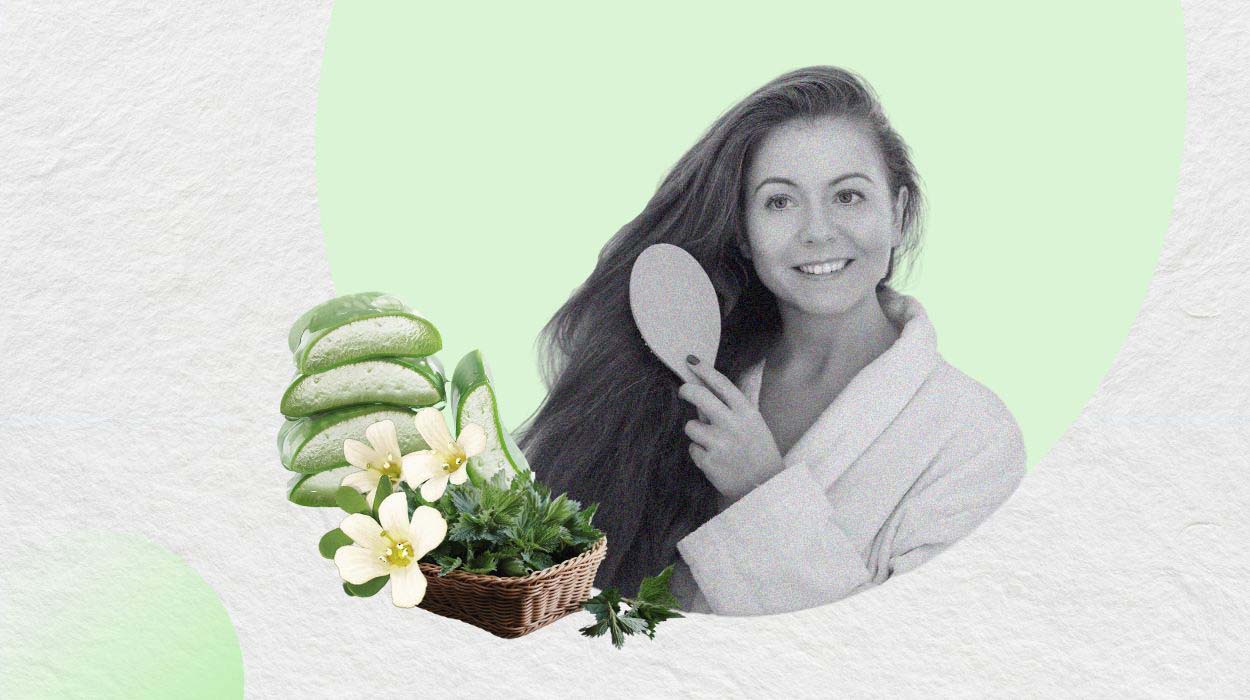 Expert's opinion
Expert's opinion
Expert's opinion
The article is a subjective view on this topic written by writers specializing in medical writing.
It may reflect on a personal journey surrounding struggles with an illness or medical condition, involve product comparisons, diet considerations, or other health-related opinions.
Although the view is entirely that of the writer, it is based on academic experiences and scientific research they have conducted; it is fact-checked by a team of degreed medical experts, and validated by sources attached to the article.
The numbers in parenthesis (1,2,3) will take you to clickable links to related scientific papers.
Herbs For Hair Growth: 10 Plants You Should Know In 2024

Herbs are the oldest form of medicine. Throughout history, they’ve been used to help heal and repair everything from scars to infections, to hair health. And since they’re all-natural, their side effects are usually minimal compared to lab-based medicine.
So if you’re looking to avoid the risks of medication for hair health, look no further. We’ve got a list of the top 10 herbs for hair growth with proven track records. Each herb has its own unique benefits, so read on to find out which one will suit your needs best.
10 Best Herbs For Hair Growth
These 10 natural herbs for hair growth help nourish your scalp and promote strong and healthy hair growth:
- Aloe Vera.
- Lavender.
- Peppermint.
- Rosemary.
- Ginseng.
- Chinese Hibiscus.
- Bacopa Monnieri.
- Coat Buttons.
- Stinging Nettle.
- Indian Spikenard.
10 Natural Herbs For Hair Growth & Thickness
There is no one best herb for hair growth. Here is how each contributes to new hair growth and overall health:
Aloe Vera
Aloe vera is a famously versatile natural remedy, used for both internal and external body conditions. It’s popularly used to help heal the skin from sunburns and to fight infection. But aloe vera gel also balances scalp pH and acts as a hair conditioner.
Aloe vera gel has fatty acids, essential amino acids, vitamins, minerals, and plant steroids responsible for its hair benefits. In a 2019 study[1], Aloe vera offered[2] antioxidant, anti-inflammatory, immuno-modulatory, antimicrobial, antiviral, antidiabetic, anticancer, and skin-protective properties.
It was beneficial for hair loss, dryness, irritation, itching, and dandruff.
Lavender
Lavender oil has been linked to numerous benefits, including increased hair thickness, healthy scalp, and hair density.
Lavender oil offers consistent hair health benefits[3] when mixed with different carrier oils such as jojoba and minoxidil. Research has demonstrated skin samples with an increase in hair follicle number and depth and an increase in dermal layer thickness.
Peppermint: Herbs That Grow Hair
Peppermint has been used over the years as a gastric stimulant, skin conditioner, and fragrance in cosmetics.
When mixed with saline, minoxidil, and jojoba in different concentrations during a 4-week animal-based study, pure peppermint oil resulted in[4] greater dermal thickness, follicle depth, and follicle number.
Researchers also observed an increase in growth factor and hair cycle enzyme activity.
The study demonstrated peppermint can be an effective healthy hair growth stimulant. It may also help reduce scalp irritation and treat fungal infections.
Rosemary
Rosemary is an anti-inflammatory herb that improves blood circulation and promotes nerve growth. It could promote hair health by transporting nutrients to the scalp and moisturizing it to prevent dandruff.
In a human-based study, rosemary effectively remedied androgenic alopecia[5] – AGA. The herb showed a significant increase in hair count after six months of application.
When tested against minoxidil, rosemary produced less scalp itching.
Some rosemary products have also been advertised for preventing premature graying, but this isn’t backed by sufficient evidence.
Ginseng: Hair Growth Herbs
In animal research, applying red ginseng oil to shaved mice supported hair regeneration[6] by inducing an early growth phase in the hair cycle. During the experiment, researchers observed a significant increase in hair thickness and the density of hair follicles.
They concluded that compounds such as β-sitosterol and linoleic acids in ginseng were responsible for the increased hair growth.
Ginseng also induces cytoprotective systems and reduces inflammation and apoptosis, i.e., cell death, amassing a protective layer of skin to protect against UVC-induced damage.
Chinese Hibiscus
Chinese hibiscus, often taken in tea, is one of the oldest Chinese herbs for hair. It can increase hair follicle count and size and promote hair growth.
A study compared how effectively hibiscus leaves and flowers promote hair growth. Ethanol extract from hibiscus leaves and flowers was applied to shaved rats, and hibiscus leaves showed significant effects on hair growth.
Besides promoting hair regrowth, Chinese hibiscus has also been used to counter scalp infections and to condition the scalp.
Bacopa Monnieri
Brahmi, the extract of Bacopa monnieri, has been used for both hair and skincare for thousands of years.
Some of its most popular applications include treating hair loss conditions like alopecia areata and stimulating hair growth. The herb’s alkaloids activate proteins linked to hair growth, countering hair loss.
But in regular daily hair products, Bacopa monnieri is mainly included to treat and prevent dandruff.
Coat Buttons
Coat buttons have been used in Indian and Ayurveda medicine as a hair tonic and growth stimulant. They are rich in antioxidants, which enhance healing. The herb has several compounds that support hair health[7] in different ways.
For example, beta-sitosterol is a compound that can reduce hair loss while saponins promote antifungal and antibacterial activity. Tannin may convert gray hair into black hair, Gluco luteolin reduces dandruff and prevents breakage, and flavonoids offer antioxidant effects.
Stinging Nettle
Stinging nettle has been used in shampoos and bathing soaps for hair restoration. Some of its most acclaimed benefits include reducing itchiness and countering dandruff.
Stinging nettle carries sulfur and silica,[8] which can strengthen the hair shaft to prevent hair loss. Other sources say that the herb inhibits the production of dihydrotestosterone, or DHT — the hormone derived from testosterone whose excessive production causes thinning hair.
Stinging nettle also promotes blood flow to the scalp, nourishing the hair follicles. It has anti-inflammatory effects that can improve hair health and reduce hair loss.
Nardostachys Jatamansi
Jatamansi is a popular Ayurvedic remedy thanks to its antispasmodic and laxative properties. It’s also used for digestive, circulatory, neurological, urinary, and skin disorders[9].
Jatamansi contains antifungal and anti-bacterial properties that protect the scalp against infections and dandruff.
The remedy has also been used to support follicle health, promote growth, increase volume, extend the growth phase, and improve hair texture, color, and strength.
Are Herbs Good For Hair Growth?
Yes, there are many herbs good for hair growth. For thousands of years, they have served as hair treatments, nurturing scalp health and enhancing hair thickness.
Although many share similar benefits, you might need to combine several herbs to get the results you want.
Due to their natural state, most herbs have minimal side effects, but the potential benefits are highly satisfying. Some shared benefits include preventing fungal infections, moistening the scalp, and promoting blood circulation.
These benefits have been scientifically established through studies on humans, animals, and laboratory methods.
How To Use Hair Growth Herbs?
Different herbs have different formulations that result in various usage recommendations, but most products for hair are either ingested or applied topically.
Most natural herbs that promote hair growth are mixed with a carrier, such as coconut and jojoba oils, to dilute them into the optimal potencies for effectiveness. Other common carrier oils include olive, mineral, sweet almond, and wheat germ.
Before applying any herbs and oils, wash your scalp with shampoo to eliminate contaminants that may react or reduce the effectiveness of herbs. You should also read every manufacturer’s instructions, as some herbal products should not be mixed with certain shampoo types.
Also, some herbs must be applied on damp hair, while some work better on dry hair.
Upon application, massage the oil into the scalp for adequate absorption. Finally, rinse your scalp and apply any other complementary steps as instructed. Moisturizing with a good conditioner is also essential to avoid dry hair.
Side Effects & Precautions
As is true with many hair supplements, herbal remedies may have mild to severe side effects depending on their chemical compositions and application methods.
The side effects vary but might involve irritation and inflammation. Luckily, most organic herbal products on this list are free from severe side effects.
You shouldn’t ingest any herbs or products that are strictly designed for topical application can lead to adverse side effects.
While you may ingest herbs such as stinging nettle, rosemary, and aloe vera, most should only be applied to the scalp.
The method of administration also varies across different herbs, so research the application method before applying.
The Bottom Line
Herbs for hair growth are growing in popularity thanks to their safety in use when compared to prescribed pharmaceuticals and over-the-counter drugs.
Although they may have fewer or less noticeable effects than supplements or medication, ongoing studies reveal additional benefits and better ways to use herbs for your hair. They can also be easy to find and grow, like aloe vera, peppermint, lavender, and ginseng.
It might only be a matter of time before full-fledged natural products rival the effectiveness of their artificial counterparts.
+ 9 sources
Health Canal avoids using tertiary references. We have strict sourcing guidelines and rely on peer-reviewed studies, academic researches from medical associations and institutions. To ensure the accuracy of articles in Health Canal, you can read more about the editorial process here
- Umar, S. and Noreen, S. (2020). A Close Look at Aloe Vera Barbadensis and It’s Effect on Hair Health. [online] ResearchGate. Available at: https://www.researchgate.net/publication/342588964_A_Close_Look_at_Aloe_Vera_Barbadensis_and_It’s_Effect_on_Hair_Health#:~:text=The%20subjects%20were,hair%20tensile%20strength.
- Kumar, R., Amit Kumar Singh, Gupta, A., Anupam Bishayee and Pandey, A.K. (2019). Therapeutic potential of Aloe vera—A miracle gift of nature. Phytomedicine, [online] 60, pp.152996–152996. doi:https://doi.org/10.1016/j.phymed.2019.152996.
- Lee, B.H., Lee, J.S. and Kim, Y.C. (2016). Hair Growth-Promoting Effects of Lavender Oil in C57BL/6 Mice. Toxicological Research, [online] 32(2), pp.103–108. doi:https://doi.org/10.5487/tr.2016.32.2.103.
- Oh, J.Y., Park, M.A. and Kim, Y.C. (2014). Peppermint Oil Promotes Hair Growth without Toxic Signs. Toxicological Research, [online] 30(4), pp.297–304. doi:https://doi.org/10.5487/tr.2014.30.4.297.
- Panahi (2015). Rosemary oil vs minoxidil 2% for the treatment of androgenetic alopecia: a randomized comparative trial. Skinmed, [online] 13(1). Available at: https://pubmed.ncbi.nlm.nih.gov/25842469/#:~:text=A%20standardized%20professional,treatment%20of%20AGA.
- Truong, V.-L., Keum, Y.-S. and Jeong, W.-S. (2021). Red ginseng oil promotes hair growth and protects skin against UVC radiation. Journal of Ginseng Research, [online] 45(4), pp.498–509. doi:https://doi.org/10.1016/j.jgr.2020.12.008.
- Jing, W., Xiaolan, C., Yu, C., Feng, Q. and Haifeng, Y. (2022). Pharmacological effects and mechanisms of tannic acid. Biomedicine & Pharmacotherapy, [online] 154, p.113561. doi:https://doi.org/10.1016/j.biopha.2022.113561.
- Journal of Experimental Pharmacology. (2023). A Systematic Review of Ethnobotanical, Phytochemical, and Ethnopharmacological Studies of Urtica simensis (Stinging Nettle). [online] Available at: https://www.tandfonline.com/doi/full/10.2147/JEP.S404506
- Sahu, R., Hemant Dhongade, Pandey, A. and Kashyap, P. (2016). Medicinal Properties of Nardostachys jatamansi (A Review). [online] ResearchGate. Available at: https://www.researchgate.net/publication/303531421_Medicinal_Properties_of_Nardostachys_jatamansi_A_Review



